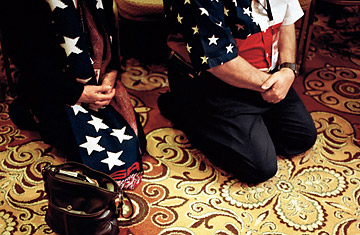
Convention attendees kneel in prayer at the National Tea Party Convention.
(5 of 6)
A second recurring note is darker. Like many other populist movements in American history, Tea Parties have become magnets for conspiracy mongers and nativists. Nashville conventioneers roared their approval when former Colorado Representative Tom Tancredo blamed Obama's election on voters who can't speak English. Because "we do not have a civics, literacy test before people can vote in this country," Tancredo declared, Americans "put a committed socialist ideologue in the White House ... Barack Hussein Obama"--with an ominous emphasis on the President's middle name. Perhaps the most talked-about book of the convention was The 5,000 Year Leap, by the late right-wing writer W. Cleon Skousen, which argues that the Founding Fathers set up the U.S. on firm Christian bedrock and designed the Constitution to maximize individual liberty and free enterprise. Speaker after speaker commended the volume, a favorite of Glenn Beck's, and though it is far from Skousen's most extreme statement, with Skousen, even the mild stuff is controversial. A proponent of the idea that Wall Street bankers are plotting to replace the Constitution with a new world order, Skousen roamed so far beyond the fringe that his own Mormon church distanced itself from his work and the thoroughly conservative magazine National Review described him as an "all-around nutjob."
A third strand of thinking is more prosaic and might feel familiar to survivors of politics of the early 1990s. That too was an era of deep divisions and wildly swinging opinion polls: Obama's recent roller-coaster ride is nothing compared with the 50-point plunge in George H.W. Bush's ratings as he approached his re-election campaign. Then, as now, the culprit was a sour economy, but the voice of indignation came not from TV ranters but from a Dallas billionaire. H. Ross Perot catalyzed an anti-incumbent, back-to-basics, pox-on-Washington movement that is the spiritual ancestor of today's Tea Parties--right down to the hand-painted placards and the occasional powdered wig. Suzanne Curran, a Tea Partyer from Virginia, sounded as if she had stepped out of a time machine straight from a Perot rally when she said recently, "It's time that we speak up--we the people. We are the employers. All these elected reps are the employees. And we need to stop calling them officials, giving them more credit than is due them."
Yet it's striking that the Reform Party, founded by Perot to keep his crusade alive, has virtually no appeal to the Tea Party crowd. There is a lesson in that. Grass-roots uprisings come and go, and protest candidates rise and fall. In the flush of righteous battle, people focus on the beliefs they share and tolerate points of difference. Eventually, though, the battle ends, the smoke clears, and even when the movement has some success, its troops tend to go their separate ways. After Perot retired from politics, his movement fell to pieces; Patrick Buchanan carried the Reform Party's banner in one election, and Ralph Nader did so in the next, which makes about as much sense as a radio station alternating between hip-hop and harp music. Building an enduring party that is able to outlast leaders, heal divisions, withstand opportunists and adjust to changing times turns out to be extremely difficult.
